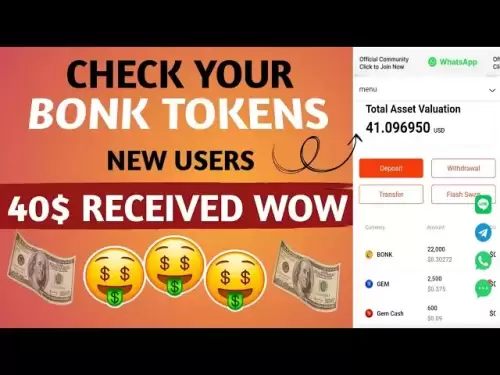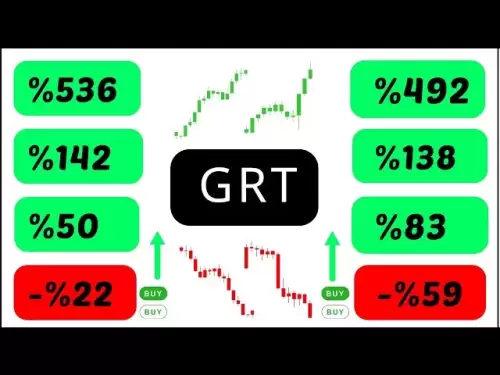-
 Bitcoin
Bitcoin $107,249.0548
1.30% -
 Ethereum
Ethereum $2,416.1035
-0.85% -
 Tether USDt
Tether USDt $1.0005
-0.01% -
 XRP
XRP $2.1838
0.09% -
 BNB
BNB $645.4660
0.43% -
 Solana
Solana $142.9238
-1.44% -
 USDC
USDC $0.9999
-0.01% -
 TRON
TRON $0.2728
-0.58% -
 Dogecoin
Dogecoin $0.1640
-0.57% -
 Cardano
Cardano $0.5656
-3.35% -
 Hyperliquid
Hyperliquid $36.8161
-1.37% -
 Bitcoin Cash
Bitcoin Cash $482.7706
6.42% -
 Sui
Sui $2.7207
-1.96% -
 Chainlink
Chainlink $13.1222
-1.67% -
 UNUS SED LEO
UNUS SED LEO $8.9975
0.11% -
 Stellar
Stellar $0.2408
-2.82% -
 Avalanche
Avalanche $17.5074
-3.61% -
 Toncoin
Toncoin $2.8268
-2.20% -
 Shiba Inu
Shiba Inu $0.0...01159
-0.33% -
 Litecoin
Litecoin $84.4122
-0.30% -
 Hedera
Hedera $0.1499
-1.97% -
 Monero
Monero $311.6467
-0.68% -
 Ethena USDe
Ethena USDe $1.0003
-0.03% -
 Dai
Dai $0.9999
0.00% -
 Polkadot
Polkadot $3.3543
-2.07% -
 Bitget Token
Bitget Token $4.4004
2.32% -
 Pi
Pi $0.6261
15.37% -
 Uniswap
Uniswap $6.9770
-0.83% -
 Pepe
Pepe $0.0...09449
-5.16% -
 Aave
Aave $255.1647
-2.85%
xrp ripple currency lawsuit time
The Ripple lawsuit, pitting the SEC against the blockchain company over the classification of XRP, has profound implications for the cryptocurrency industry's regulatory future.
Jan 20, 2025 at 09:36 pm

Ripple Lawsuit: A Comprehensive Guide for Beginners
Ripple, the blockchain company behind the XRP cryptocurrency, has been embroiled in a legal battle with the United States Securities and Exchange Commission (SEC) since 2020. The lawsuit has far-reaching implications for the cryptocurrency industry, and if Ripple loses, it could set a precedent for how other digital assets are regulated.
In this guide, we'll delve into the details of the Ripple lawsuit, explain its significance, and provide insights into what the future holds for XRP and the broader crypto market.
Background: What is Ripple?
Ripple is a payment and settlement network that aims to revolutionize cross-border transactions. Its native cryptocurrency, XRP, is used as a bridge currency to facilitate faster, cheaper, and more transparent payments between different currencies and financial institutions.
The SEC Lawsuit
In December 2020, the SEC filed a lawsuit against Ripple, alleging that the company had raised over $1.3 billion through the sale of XRP by failing to register it as a security. The SEC argued that XRP is an investment contract, meaning that it meets the criteria of a security under U.S. law.
Key Legal Issues
The Ripple lawsuit hinges on several key legal issues, including:
- Classification of XRP: Is XRP a security or a currency? The SEC believes it's a security, while Ripple contends it's a currency.
- Disclosure of Information: Did Ripple adequately disclose the risks associated with XRP investments? The SEC alleges that it did not.
- Market Manipulation: Did Ripple manipulate the price of XRP? The SEC has not made specific accusations in this regard.
Implications of the Lawsuit
The outcome of the Ripple lawsuit has significant implications for the cryptocurrency industry:
- Regulatory Clarity: A ruling in favor of the SEC could provide much-needed regulatory clarity for the crypto market, especially regarding the classification of digital assets.
- Market Impact: A negative outcome for Ripple could lead to a sell-off in XRP and potentially other cryptocurrencies.
- Future of XRP: The lawsuit could determine the viability of XRP as a cryptocurrency and its future role in the payment ecosystem.
Current Status and Timeline
The Ripple lawsuit is ongoing, with both parties filing motions and engaging in discovery. A trial date has not yet been set. Experts predict that the case could take several years to resolve.
What's Next for XRP and the Crypto Market?
The future of XRP and the broader cryptocurrency market remains uncertain until the Ripple lawsuit is resolved. However, there are a few possible scenarios:
- Settlement: Ripple and the SEC could reach a settlement, potentially involving a fine and agreement on the classification of XRP.
- Victory for Ripple: If Ripple wins the lawsuit, it would be a major victory for the cryptocurrency industry and provide a boost to XRP's status.
- Victory for SEC: A victory for the SEC would likely lead to increased regulatory scrutiny of digital assets and potentially hinder their growth.
Conclusion
The Ripple lawsuit is a watershed moment for the cryptocurrency industry. Its outcome will shape the regulatory landscape for digital assets and have far-reaching implications for the future of XRP and the broader crypto market. As the case progresses, it's crucial for investors to stay informed and understand the potential risks and opportunities involved.
Disclaimer:info@kdj.com
The information provided is not trading advice. kdj.com does not assume any responsibility for any investments made based on the information provided in this article. Cryptocurrencies are highly volatile and it is highly recommended that you invest with caution after thorough research!
If you believe that the content used on this website infringes your copyright, please contact us immediately (info@kdj.com) and we will delete it promptly.
- Bittensor (TAO) Price: Demand Zone in Focus as Institutional Interest Heats Up
- 2025-06-26 06:50:12
- Arctic Pablo Coin, Pudgy Penguins, and Crypto Investment: Navigating the Hype
- 2025-06-26 06:27:13
- Melania Trump Token: Price Dump and Team Cashout Raises Eyebrows
- 2025-06-26 07:06:07
- AMP Crypto, Whale Buy, Token Boom: Decoding the Latest Trends
- 2025-06-26 07:25:13
- Trump, Meme Coins, and Crypto Regulation: A New York Minute on the Wild West of Digital Finance
- 2025-06-26 07:25:13
- NBA, Trades, and Coin Flips: When Luck Decides More Than Just a Game
- 2025-06-26 07:30:12
Related knowledge

How to customize USDT TRC20 mining fees? Flexible adjustment tutorial
Jun 13,2025 at 01:42am
Understanding USDT TRC20 Mining FeesMining fees on the TRON (TRC20) network are essential for processing transactions. Unlike Bitcoin or Ethereum, where miners directly validate transactions, TRON uses a delegated proof-of-stake (DPoS) mechanism. However, users still need to pay bandwidth and energy fees, which are collectively referred to as 'mining fe...

USDT TRC20 transaction is stuck? Solution summary
Jun 14,2025 at 11:15pm
Understanding USDT TRC20 TransactionsWhen users mention that a USDT TRC20 transaction is stuck, they typically refer to a situation where the transfer of Tether (USDT) on the TRON blockchain has not been confirmed for an extended period. This issue may arise due to various reasons such as network congestion, insufficient transaction fees, or wallet-rela...

How to cancel USDT TRC20 unconfirmed transactions? Operation guide
Jun 13,2025 at 11:01pm
Understanding USDT TRC20 Unconfirmed TransactionsWhen dealing with USDT TRC20 transactions, it’s crucial to understand what an unconfirmed transaction means. An unconfirmed transaction is one that has been broadcasted to the blockchain network but hasn’t yet been included in a block. This typically occurs due to low transaction fees or network congestio...

How to check USDT TRC20 balance? Introduction to multiple query methods
Jun 21,2025 at 02:42am
Understanding USDT TRC20 and Its ImportanceUSDT (Tether) is one of the most widely used stablecoins in the cryptocurrency market. It exists on multiple blockchain networks, including TRC20, which operates on the Tron (TRX) network. Checking your USDT TRC20 balance accurately is crucial for users who hold or transact with this asset. Whether you're sendi...

What to do if USDT TRC20 transfers are congested? Speed up trading skills
Jun 13,2025 at 09:56am
Understanding USDT TRC20 Transfer CongestionWhen transferring USDT TRC20, users may occasionally experience delays or congestion. This typically occurs due to network overload on the TRON blockchain, which hosts the TRC20 version of Tether. Unlike the ERC20 variant (which runs on Ethereum), TRC20 transactions are generally faster and cheaper, but during...

The relationship between USDT TRC20 and TRON chain: technical background analysis
Jun 12,2025 at 01:28pm
What is USDT TRC20?USDT TRC20 refers to the Tether (USDT) token issued on the TRON blockchain using the TRC-20 standard. Unlike the more commonly known ERC-20 version of USDT (which runs on Ethereum), the TRC-20 variant leverages the TRON network's infrastructure for faster and cheaper transactions. The emergence of this version came as part of Tether’s...

How to customize USDT TRC20 mining fees? Flexible adjustment tutorial
Jun 13,2025 at 01:42am
Understanding USDT TRC20 Mining FeesMining fees on the TRON (TRC20) network are essential for processing transactions. Unlike Bitcoin or Ethereum, where miners directly validate transactions, TRON uses a delegated proof-of-stake (DPoS) mechanism. However, users still need to pay bandwidth and energy fees, which are collectively referred to as 'mining fe...

USDT TRC20 transaction is stuck? Solution summary
Jun 14,2025 at 11:15pm
Understanding USDT TRC20 TransactionsWhen users mention that a USDT TRC20 transaction is stuck, they typically refer to a situation where the transfer of Tether (USDT) on the TRON blockchain has not been confirmed for an extended period. This issue may arise due to various reasons such as network congestion, insufficient transaction fees, or wallet-rela...

How to cancel USDT TRC20 unconfirmed transactions? Operation guide
Jun 13,2025 at 11:01pm
Understanding USDT TRC20 Unconfirmed TransactionsWhen dealing with USDT TRC20 transactions, it’s crucial to understand what an unconfirmed transaction means. An unconfirmed transaction is one that has been broadcasted to the blockchain network but hasn’t yet been included in a block. This typically occurs due to low transaction fees or network congestio...

How to check USDT TRC20 balance? Introduction to multiple query methods
Jun 21,2025 at 02:42am
Understanding USDT TRC20 and Its ImportanceUSDT (Tether) is one of the most widely used stablecoins in the cryptocurrency market. It exists on multiple blockchain networks, including TRC20, which operates on the Tron (TRX) network. Checking your USDT TRC20 balance accurately is crucial for users who hold or transact with this asset. Whether you're sendi...

What to do if USDT TRC20 transfers are congested? Speed up trading skills
Jun 13,2025 at 09:56am
Understanding USDT TRC20 Transfer CongestionWhen transferring USDT TRC20, users may occasionally experience delays or congestion. This typically occurs due to network overload on the TRON blockchain, which hosts the TRC20 version of Tether. Unlike the ERC20 variant (which runs on Ethereum), TRC20 transactions are generally faster and cheaper, but during...

The relationship between USDT TRC20 and TRON chain: technical background analysis
Jun 12,2025 at 01:28pm
What is USDT TRC20?USDT TRC20 refers to the Tether (USDT) token issued on the TRON blockchain using the TRC-20 standard. Unlike the more commonly known ERC-20 version of USDT (which runs on Ethereum), the TRC-20 variant leverages the TRON network's infrastructure for faster and cheaper transactions. The emergence of this version came as part of Tether’s...
See all articles
























































































